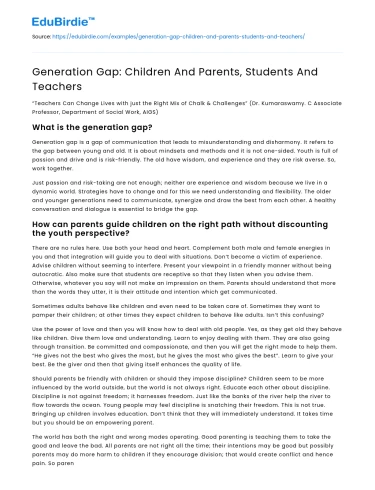“Teachers Can Change Lives with just the Right Mix of Chalk & Challenges” (Dr. Kumaraswamy. C Associate Professor, Department of Social Work, AIGS)
What is the generation gap?
Generation gap is a gap of communication that leads to misunderstanding and disharmony. It refers to the gap between young and old. It is about mindsets and methods and it is not one-sided. Youth is full of passion and drive and is risk-friendly. The old have wisdom, and experience and they are risk averse. So, work together.
Save your time!
We can take care of your essay
- Proper editing and formatting
- Free revision, title page, and bibliography
- Flexible prices and money-back guarantee
Just passion and risk-taking are not enough; neither are experience and wisdom because we live in a dynamic world. Strategies have to change and for this we need understanding and flexibility. The older and younger generations need to communicate, synergize and draw the best from each other. A healthy conversation and dialogue is essential to bridge the gap.
How can parents guide children on the right path without discounting the youth perspective?
There are no rules here. Use both your head and heart. Complement both male and female energies in you and that integration will guide you to deal with situations. Don’t become a victim of experience. Advise children without seeming to interfere. Present your viewpoint in a friendly manner without being autocratic. Also make sure that students are receptive so that they listen when you advise them. Otherwise, whatever you say will not make an impression on them. Parents should understand that more than the words they utter, it is their attitude and intention which get communicated.
Sometimes adults behave like children and even need to be taken care of. Sometimes they want to pamper their children; at other times they expect children to behave like adults. Isn’t this confusing?
Use the power of love and then you will know how to deal with old people. Yes, as they get old they behave like children. Give them love and understanding. Learn to enjoy dealing with them. They are also going through transition. Be committed and compassionate, and then you will get the right mode to help them. “He gives not the best who gives the most, but he gives the most who gives the best”. Learn to give your best. Be the giver and then that giving itself enhances the quality of life.
Should parents be friendly with children or should they impose discipline? Children seem to be more influenced by the world outside, but the world is not always right. Educate each other about discipline. Discipline is not against freedom; it harnesses freedom. Just like the banks of the river help the river to flow towards the ocean. Young people may feel discipline is snatching their freedom. This is not true. Bringing up children involves education. Don’t think that they will immediately understand. It takes time but you should be an empowering parent.
The world has both the right and wrong modes operating. Good parenting is teaching them to take the good and leave the bad. All parents are not right all the time; their intentions may be good but possibly parents may do more harm to children if they encourage division; that would create conflict and hence pain. So parents’ intention may be good but they have also have to inwardly cleanse themselves.
Generation Gap between Students and Teachers
As a college professor, despite the fact that I am not that much older than my students, I still find myself marveling at what feels like wide differences between our experiences, particularly our frame of references. The truth is, the younger generations are being raised in a culture vastly different than the one the rest of us were raised in. The obvious technological advances are just the most glaring or observable difference one could point to. The widening gap between the rich and poor in our country and the economic recession is another significant factor to consider.
Educational Institutions are facing the big challenge of balancing the needs of different generations of both students and educators. Among the different generations, there are huge differences in the language used, in usage and access to technology, and even in attitude toward life. The current curriculum, and teaching methodologies serve the needs of the previous generation, but they fail to deliver the desired results for the present and future generations. Many students today feel bored in traditional classrooms because they don't identify with what's being taught; conversely, many teachers feel tired, unmotivated, and disturbed because despite their best efforts, they cannot reach their students. The burning issue facing the world of academics today is how to bridge the gap between these generations.
In the present systems, there is a gap not only between students and teachers, but also between senior teachers and the young new teachers joining the education system. More expert teachers may have mastered content, while younger teachers may be more familiar with the tools students enjoy using.
We conclude that to suggest the concept of 'mutual mentoring,' wherein mentoring takes place both ways between the different generations of educators. Expert teachers can pass on their experience in terms skills, practice of with the content knowledge to the beginning teachers, who, in turn, can mentor their colleagues regarding new technology tools and newer ways of teaching and learning. Also, act as supporter of asking for student input to help make lesson delivery more interesting and understandable. If students are not learning the way we teach, and then I think it's time we start teaching them the way they learn without compromising quality.






 Stuck on your essay?
Stuck on your essay?

